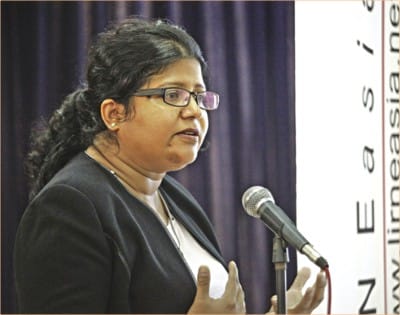Bangladesh gets poor health card in telecoms regulation

LIRNEasia's Chief Operating Officer Helani Galpaya speaks at a press conference in Dhaka yesterday.Photo: STAR
Bangladesh has ranked sixth among seven South and Southeast Asian countries in a survey on regulatory and policy environment in the telecoms sector, due to uncertainties over polices and laws and other recent developments.
Bangladesh trailed Pakistan, India, Thailand, the Philippines, Sri Lanka and fared better than Indonesia, according to the survey conducted by LIRNEasia.
Bangladesh scored 53.9 out of 105 while Pakistan scored 70, India 58.3, Thailand 56.7, the Philippines 55.5, Sri Lanka 55.2, and Indonesia 52.9.
Bangladesh's performance was below average as its no sub-sector received a score higher than the midpoint of 3 on a scale of 5, said the Sri Lanka based-ICT policy and regulation think tank while releasing the survey results at a press conference at La Vinci Hotel in Dhaka yesterday.
Top officials in the country's telecom sector were asked to evaluate the effectiveness of the regulatory and policy environment in the last one year in three telecom sub-sectors -- fixed, mobile and broadband under the survey, “Telecom Regulatory Environment (TRE)”.
In the survey conducted between February and March 2011, seven dimensions such as market entry, access to scarce resources, interconnection, tariff regulation, anti-competitive practices, universal service obligation and quality of service were evaluated.
During the launch of the report, LIRNEasia's Chief Operating Officer Helani Galpaya said the average TRE scores for the three sectors varied -- the fixed-line telephony scored the lowest overall score (2.3), while mobile telephony scored the highest (2.9), followed by broadband (2.5).
The survey said a nationwide decline in fixed-line use and the licence cancellation of five public switched telephone network (PSTN) operators on charges of running illegal VoIP operations could have contributed to low scores, on average, for the fixed-phone sector.
On the mobile side, the Bangladesh Telecommunication Regulatory Commission (BTRC)'s facilitation of competition between mobile market players, low-user tariffs (which are some of the lowest in the world), nationwide coverage and the ability to interconnect are some of the key reasons that helped the sub-sector score high.
According to the report, the average score for the mobile sector is still below the average threshold of 3. This could be due to the sense of uncertainty caused by the amended Telecommunication Act of 2010 and the inequity in the proposed 2G license renewal guidelines.
Chairman and Chief Executive Officer of LIRNEasia Rohan Samarajiva said the scores could change next year after completion of the 2G licencing process.
Faheem Hussain, assistant professor of Asian University for Women, also spoke.
RECOMMENDATIONS
LIRNEasia recommends improving the rank by deploying a market and investment-friendly licence renewal process, prompting tariff approval procedures, acting against anti-competitive practices, rethinking universal obligation fund and the social obligation fund under 2G licence renewal guidelines and streamlining pro-people provisions etc.

 For all latest news, follow The Daily Star's Google News channel.
For all latest news, follow The Daily Star's Google News channel. 



Comments